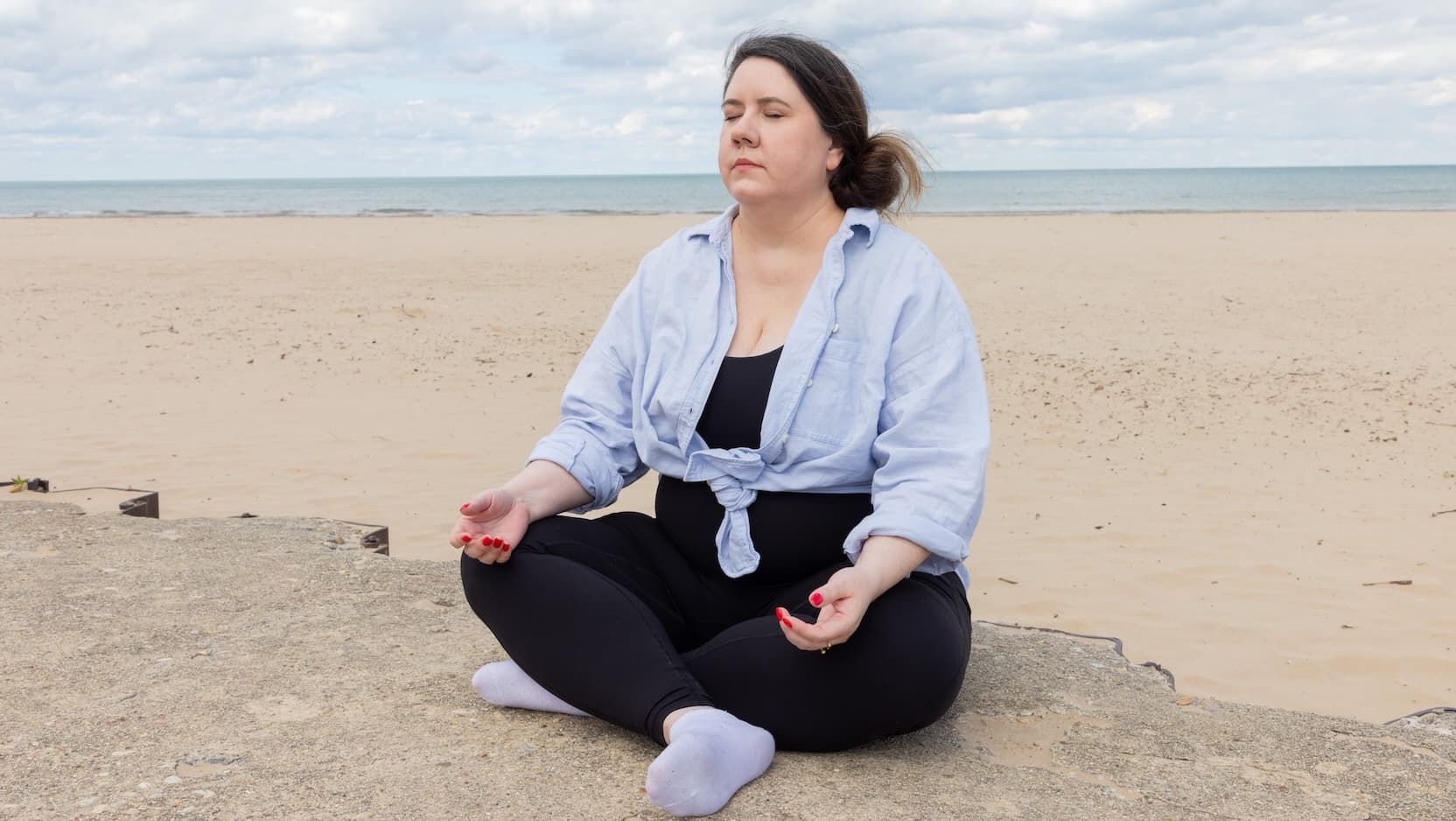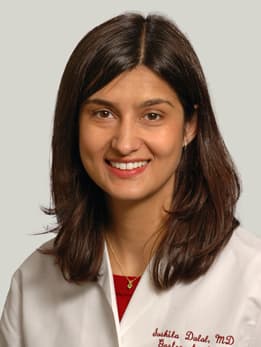From pain to inner peace: Personalized care for Crohn’s disease

When she was diagnosed with Crohn’s disease in 2017, Shanna Quinn couldn’t believe it.
“I knew other people with Crohn’s or colitis, and my perception was that they were always in the bathroom, malnourished or couldn’t eat anything — that wasn’t me,” said Quinn, who was in her mid-30s at the time and otherwise healthy and active.
Crohn’s, a form of inflammatory bowel disease (IBD) that affects the digestive tract, doesn’t look the same for everyone, and its main cause is unknown. Typical symptoms may include diarrhea, bloating, constipation and rectal bleeding.
Faced with a nagging pain in her abdomen, Quinn saw a doctor who was dismissive, suggesting she lose weight. But the pain continued, and she would get sick for extended periods after eating something healthy, such as popcorn or a salad.
She pressed her primary care doctor to order a CT scan, which revealed inflammation in her small intestine, leading to a colonoscopy and a Crohn’s diagnosis.
Second opinion for Crohn’s disease
Frustrated with the care she received elsewhere, Quinn wanted a second opinion — and a doctor who made her feel comfortable and heard.
In early 2019, she saw Sushila Dalal, MD, a gastroenterologist at UChicago Medicine’s IBD Center, and her anxieties were eased.
“My old GI doctor hadn’t really explained anything, and I still didn’t fully believe I had Crohn’s,” Quinn said. “When I met Dr. Dalal, she could tell I was overwhelmed. She took the time to go through my scans and explain why my Crohn’s symptoms looked different from others.”
Dalal explained that Quinn had a stricture, or a narrowing in her intestine, causing a partial blockage. She had a healthy colon, but the end of the small intestine narrowed to the size of a pinhole, which could cause food to back up and her upper bowel to stretch like a balloon.
“Crohn’s is an overactivation of the immune system,” Dalal said. “It can happen in any part of the intestinal tract — from the mouth to the anus — though we often see it at the end of the small intestine and the beginning of the colon, which was the case with Shanna.”
This helped Quinn understand why she was having IBD symptoms such as pain, bloating and occasional vomiting, rather than frequent diarrhea like some other people she knew with IBD.
Finding the right IBD treatment
When Quinn first met with Dalal, she was nervous about her treatment options. After a long discussion, the two decided she could hold off on medication for the time being and schedule a low-risk intestinal surgery for December 2019.
The procedure, called an ileocecectomy, involves removing a small part of the bowel. At the same time, Quinn found out she needed surgery for uterine fibroids. That prompted UChicago Medicine GI surgeon Benjamin Shogan, MD, and gynecologic surgeon Laura Douglass, MD, to team up and perform both procedures during the same surgical appointment.
In early 2020, following the successful surgery, Quinn and Dalal revisited the idea of using biologic medications to help manage her Crohn’s.
It is a chronic disease, so patients generally require medication for life.
“It’s funny to think about where my brain was then versus where it is now,” said Quinn. “I was extremely nervous about going on a medication. Getting over the hump of — this is something you’re likely going to have to do for a lifetime — is really, really weird.”
Quinn agreed to start taking ustekinumab, a monoclonal antibody targeting two proteins in the body that can cause inflammation.
Team approach targets different symptoms, needs
Just as IBD symptoms vary by patient, so do their treatment plans.
After years of being symptom-free while on her medication, Quinn had a flareup of pain, constipation and bloating in 2024. It was time to reevaluate.
Dalal temporarily put Quinn on a steroid to ease the new symptoms. After a thorough round of scans, testing and more discussions, Dalal and Quinn opted for another biologic medication, adalimumab, which targets a different part of the immune system. Like many other IBD patients who have to navigate changing insurance coverage, she eventually transitioned to a biosimilar version of adalimumab.
So far, the treatment has been a success.
Beyond praising Dalal’s guidance and bedside manner, Quinn also credits UChicago Medicine’s expansive IBD team that includes nurses, dietitians, a psychologist, a support group and more.
“Shanna is an inspiration and really exemplifies what it means to advocate for yourself in your medical care,” said Anna Gomberg, Executive Director of UChicago Medicine’s IBD Center and leader of the IBD support group. “I’m so glad she’s part of our support group. She’s part of the team, too!”
The highly personalized care is by design. “It’s very common for my patients to have this idea that IBD looks the same for all IBD patients,” Dalal said. “But just because one person’s symptoms are different than another’s, it doesn’t make either case more valid than the other.”
Quinn, now 43, is doing well. The resident of Chicago's Uptown neighborhood is an avid weightlifter, regularly practices meditation and has returned to the office for her job in social media management.
“Something I’m really thankful for, with Dr. Dalal, is that it feels like we’re in this together,” Quinn said. “She built a lot of trust with me.”
Crohn's Disease Treatment at the IBD Center
Our world renowned experts collaborate to bring patients the best possible treatment and the latest research in Crohn's disease.
Learn more about our Crohn's disease services
Sushila Dalal, MD
Gastroenterologist Dr. Sushila Dalal cares for patients with inflammatory bowel disease (Crohn's disease and ulcerative colitis). She is interested in the unique challenges that face women with IBD.
Learn more about Dr. Dalal